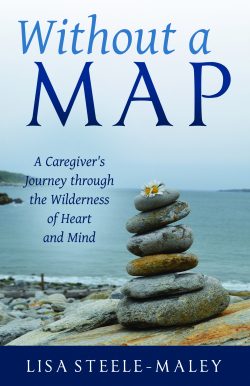In 2004, George Goens lost his daughter during the birth of his second grandchild. How does one respond to the simultaneous crash of life and death? In The Promise of Living: Loss, Life and Living, Goens wrestles with his conflicting emotions over the convergence of two very disparate events – one celebrating the beginning of life, one grieving the loss of another.
Goens begins his story at the expected date of his daughter Betsy’s birthing of her second child, Luke – his grandson. Goens’ joy slowly twists into panic, then horror when phone calls from his son reveal that the process has gone awry. Stricken by a rare complication, Betsy delivers a healthy baby but dies soon after the birth. Thus begins Goens’ journey of grief, anger and despair as he struggles to reconcile the paradox of his daughter’s premature passing juxtaposed to the developing life of his grandchildren, their family and his own life.
“Inexplicable events happen in life, many contrary to our belief in the natural order,” he writes in the book’s introduction. “Our rational plans and sense of equilibrium are upset. Chaos seems to reign in both our internal and external worlds.”
Goens re-examines his beliefs, his relationships, his perceptions, his values, his fears and his dreams of the future. He relives his close relationship with his daughter, his mid-life crisis that included a scandalizing affair costing him his marriage and job, and another shocking loss involving the shooting murder of a school principal in a district for which he served as superintendent. He wrestles with a grief many of his friends label as “excessive” and is humbled by his inability to take their advice and “move on.”
He comes to realize that, even while living in a community with family and friends, everyone must ultimately face loss alone in the quiet of their own hearts and souls.
“Life’s only script consists of birth and death,” Goens writes. “We fill in what comes between. . . .Whimsy and mystery, serendipity and surprise fill our lives. The clichéd story of a main character succumbing to tragedy, falling into a funk, having an epiphany, and seeing the light and then proceeding back into normalcy doesn’t really happen. . . . Finding peace takes time and is a creative process of small steps, plateaus, and setbacks,” he adds.
Woven throughout the book is Goens’ poetry, in equal measures stirring, contemplative, and inspiring, as exemplified in “Love and Sorrow”:
Love and sorrow are two sides of the same coin
One’s sorrow is in direct proportion to one’s
love for another when they are gone.
I am thinking of you in this time of unrelenting sorrow
in celebration of your beautiful and endearing life.
In spite of heart-wrenching circumstances, Goens and his family find a way to heal through acceptance and forgiveness, and he honors the life of his daughter by living his own to its full potential. Readers who have experienced their own devastating loss – or who are close to someone else who has – will find comfort, inspiration and wisdom in his story.





